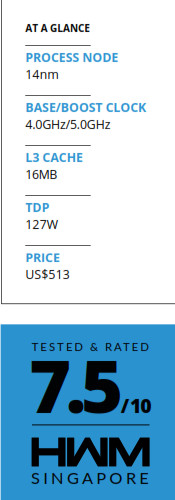Intel Core i9-9900KS Special Edition


The Intel Core i99900KS is best thought of as just another flavour of the Core i99900K. There’s already the Core i9-9900KF, which lacks any integrated graphics, so the Core i9-9900KS is more or less just a higher clocked version of both its siblings. Intel is touting this as the best processor for gaming, and while the specifications certainly look promising on paper, it doesn’t quite deliver.
The base clock has increased from 3.6GHz to 4.0GHz, and the processor now boosts to 5.0GHz on all cores. In comparison, the older Core i9-9900K was only capable of boosting to 5.0GHz on two cores at the most, in addition to a 4.7GHz Turbo frequency across six to eight cores.
It’s by no means a poorly performing Cpu, and it’s still faster than what AmD’s ryzen 3000 processors have to offer in 1080p gaming. unfortunately, it fails to convincingly beat the Core i99900K in games, so it falls short on what is supposed to be its biggest selling point. After all, while AmD’s ryzen processors handily trounce Intel’s mainstream chips in heavily-threaded workloads, Intel has still managed to hold on to its lead when it comes to games. The Core i9-9900KS should extend that lead, but it fails to live up to that promise.
To be sure, it serves up slightly better encoding and rendering performance, but the gains are small – it is after all still just a topbinned Core i9-9900K – and not quite enough to get excited about.
Furthermore, there have been reports that the Core i9-9900KS has lower IpC performance than the Core i9-9900K, which means the latter will perform better clock-for-clock. Tom’s Hardware was the one to point this out with a pre-production chip, and there may actually be a reason for the IpC dropoff. As it turns out, the Core i9-9900KS uses a new stepping of the 14nm++ process, which comes with hardware-based mitigations for the security flaws found in Intel chips over the past few years, including Spectre and meltdown.
Core stepping basically refers to a revision of the original Cpu design, so new steppings can offer things like bug fixes or improvements to the manufacturing process. The Core i99900KS uses the new r0 stepping, which is different from the P0 stepping of the Core i9-9900K.
The only consolation is that these revisions will come to the Core i9-9900K too, which could dampen its performance and put the Core i9-9900KS in a better light.
The all-core 5.0GHz boost does sound great, and there are no issues with the cores boosting to their rated speeds, unlike with AmD. but it seems this much-touted feature doesn’t quite translate to significant gains in the real world. Furthermore, the Core i9-9900KS only comes with a 1-year warranty, down from the usual 3 years for Intel. The chipmaker says this is because of the limited volume of the chip, but you can’t help but wonder if the aggressive speeds have somewhat tempered Intel’s expectations for the Cpu’s longevity.
At a recommended price of uS$513, the Core i9-9900K is slightly more expensive than the 12-core ryzen 9 3900X, which costs uS$499. AmD’s processor still offers better value, mostly owing to its superior multithreaded performance. Furthermore, its gaming numbers aren’t that far behind either, especially if you game at more demanding, Gpu-limiting settings, at which point the difference practically disappears.
The Core i9-9900K debuted at uS$488, and it’s still listed for around that price on Amazon. It still seems like the better choice to me if you want the absolute best gaming Cpu. What’s more, you get a 3-year warranty with it. The Core i99900KS is no doubt a cool proposition and 5.0GHz on all cores is really nice. But it just doesn’t seem like a smart choice given all the other options available right now.



PICTURES
INTEL























